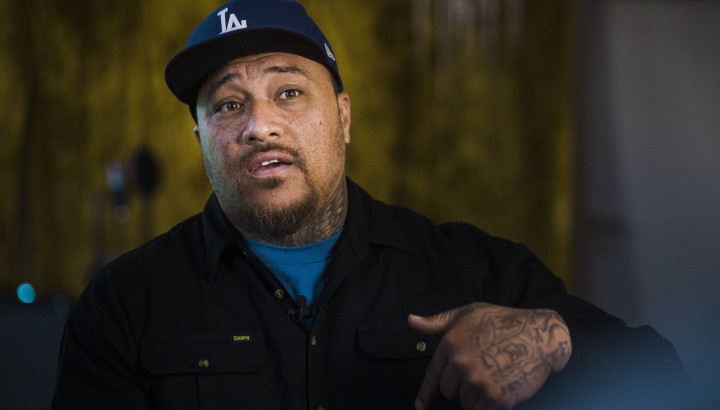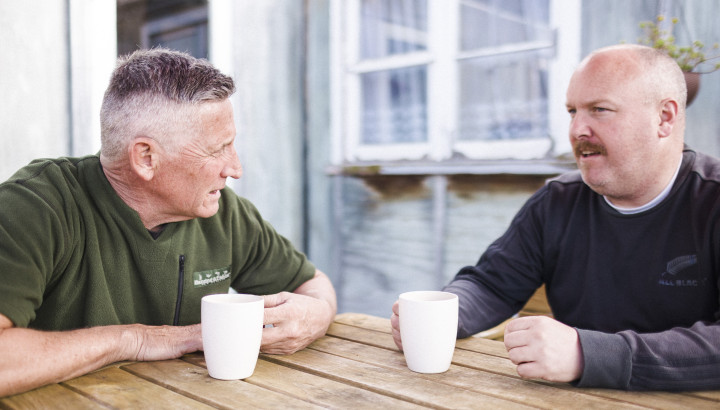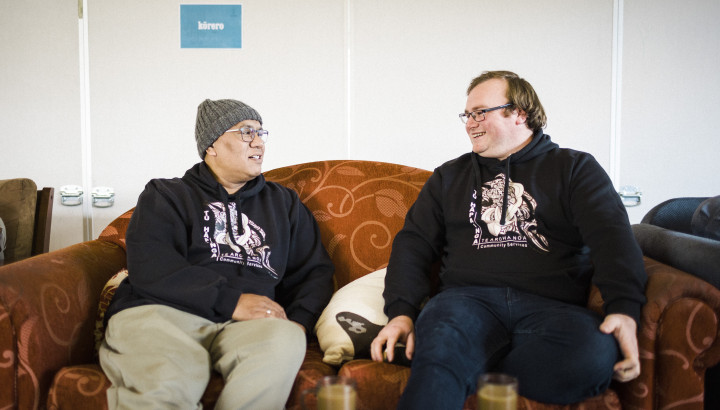Wiremu shares his motivates for staying on track and how he is now a role model for his kids..
Soft piano music plays continuously in the background for the duration of the film. On a black screen is the text ‘Warning. This video contains coarse language and discussions of violence. Viewer discretion is advised.’
A silhouette of Wiremu, in profile, as he raps into a microphone. His face is obscured by the light in the window behind him so that only an outline of his sunglasses, moustache and goatee are visible. [He speaks in voiceover].
Wiremu: “My first name, Wiremu.”
Cut to Wiremu in the lounge of his home. There is a rust-coloured curtain in the background, and we can see a microphone and various speakers around the room. Wiremu sits speaking to an interviewer who is off camera. Wiremu is a Māori man with moustache and goatee. Tattoos can be seen on his neck. He wears a black cap with ‘LA’ on it, a blue t shirt and a black Bisley shirt over the top. He uses his hands expressively when he speaks.
Wiremu: “I’m 39 years of age.”
Close-up of Wiremu’s hands, writing song lyrics in a notebook. White text appears ‘Staying On Track’ across the screen
Wiremu: “But now when I do things, I make sure that when I say something, when I do something, that stays in that moment.”
Cut back to Wiremu in the lounge.
Wiremu: “I don't think about what I lost yesterday. I don't worry about what I can be tomorrow. I've got to be present today, especially for my kids. . What our kids need today is a present dad, not someone that's thinking about yesterday, or not someone that's thinking about payday tomorrow. They need someone that's there today, present. Because anything could happen. … My outlook now is that I've got my baby … he hasn't seen any side of what I've just put my first three through.
Me and his mother still have a bit of a … towards each other, but it never gets any to the point where we were back in the day. Now, she's got a voice, now she can stand on her own two feet, now she can stand up for herself, now she can tell me what to do instead of the other way around and I would just accept it. For so many years we were like this, fighting each other, now feel that we sync as a family, and that's when everything starts falling into place.
Around my family, friends, they see the change. They see … all the steps I've taken to come through the other end. Still got the parents saying that you know, ‘I'm a bad man, I'm a bad guy,’ you know, … but I've learned now that, no matter what people say we can't change the way they think, we can't control the way that they speak, … , so don't worry about it.
The negative side is not really there, but the only negative that is there is my own thoughts, my own self, my own demons, that I've managed to teach myself to get a hold of, because when one pops they all pop you know and …”
Cut to a view from over Wiremu’s shoulder, we see him writing song lyrics in a spiral bound notebook.
Wiremu: “…I’ve got too much new habits now, to be able to fall back on the old ones.”
Cut to Wiremu at a computer, mixing music. The screen shows a digital mixing board.
Wiremu: “That music's there for me to tell my story, that's my way … releasing …”
…instead of being aggressive, being violent, going through all those steps that I went through, intimidation, now I can put it all into music.”
Cut to Wiremu sitting outside under a bare tree., wearing black headphones, looking off in the distance.
Wiremu: “So my message of hope to you would be - just find it, just find your find your way, because at the end of the day it's not going to last forever.”
Cut back to Wiremu in the lounge.
Wiremu: “You're either going to be in jail for a long time, or you're just going to keep going through the same cycle. If you want to see changes you've got to make the change, you know we can only meet you to this point. Be a better man. Do it for your family, do it for your kids. At the end of the day, you're not going to be here very long. Our next generation are coming through.
The snippet like that I feel that's helping me towards change is knowing that I can leave these tools behind for other men to grasp. The knowledge that I gain, the knowledge that I've learned, the knowledge and the tools that I've been given…”
Cut to Wiremu sitting in a high-backed booth in a restaurant, his chin high, gazing off in the distance.
Wiremu: “…to be able to pass down in my house, so I want to be able to pass it through my sons because it starts with them. I can't go outside and fix anyone's house, I've got to fix what's in my house. So, if I could pass everything down from my tools down to my kids, maybe tomorrow's generation will be a better day.”
Cut to Wiremu walking across the bridge with Chris, with his arm around Chris’s shoulders. . Chris, the facilitator of the men’s group, is a middle-aged Māori man in a black sweater, grey beanie, and glasses. He is a head shorter than Wiremu. The scene is in slow motion.
The screen fades to black. White text appears: ‘In your hands. Change starts here. For you and your whānau. Your journey isn’t a straight line, but practice can get you where you want to go.’


